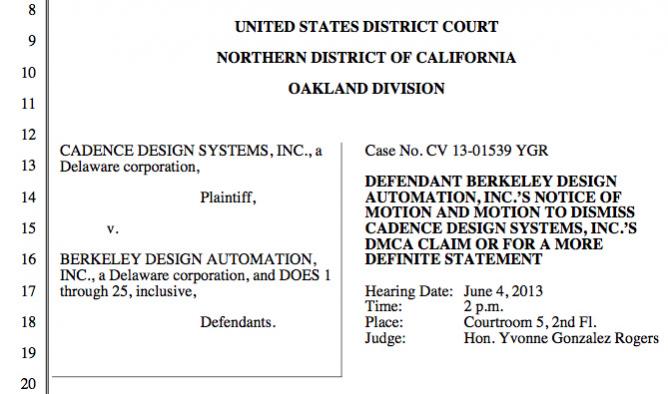 The Cadence-BDA saga continues with Berkeley Design Automation today filing a motion to dismiss. You can read the full motion HERE. My previous blog “Cadence Sues Berkeley Design Automation” with 30+ comments is HERE.
The Cadence-BDA saga continues with Berkeley Design Automation today filing a motion to dismiss. You can read the full motion HERE. My previous blog “Cadence Sues Berkeley Design Automation” with 30+ comments is HERE.
The first problem BDA brings up is that the DMCA claim by Cadence is so vague that it doesn’t state a claim on which relief can be granted. DMCA was put in place by congress as a result of lobbying by the entertainment industries primarily to make defeating DRM illegal and posting DRM-free versions of songs/movies illegal. It is not clear what BDA are supposed to have done that falls under these rules.
There are 3 ways to integrate Cadence’s ADE with Berkely. Via Oasis, via Skill or what BDA calls Unified Integration. To integrate via Oasis clearly requires a (Cadence) Oasis license. BDA claims that the Unified Integration does not (since it doesn’t use Oasis at all).
BDA used to be a member of the Cadence Connections Program (which allows non-Cadence software to be integrated into flows with Cadence software, and gives the 3rd party EDA companies very cheap access to whatever Cadence software is needed to perform the integration).
As far as I know, BDA doesn’t actively bypass the Cadence license manager or anything similar, which seems to be the sort of thing that DMCA is meant to cover. They bypass needing an Oasis license by not using Oasis, not by (for example) patching ADE so it doesn’t request a license.
So to me (as a non-lawyer, so this is totally above my pay-grade) it seems that the DMCA claim is a bit of a stretch, which means the case comes down to what BDA were or were not allowed to do to perform integration under the terms of the Connections program legal agreement that both parties signed.
Cadence’s claim is that integrating with ADE requires an Oasis license and by not integrating through Oasis then BDA is violating either DMCA and/or the terms of their Connections Program Agreement.
However, BDA’s motion claims that:”Nothing in that agreement specifies that BDA must use any ‘OASIS integration product’ or cause its customers to obtain an OASIS license.”
BDA joined the Connections Program in 2005 (HERE is a press release about it). So for 6 or 7 years there was no issue. Of course the original Cadence complaint says that they only discovered an integration not requiring Oasis last year. Since Synopsys acquired Magma (and thus FineSim) BDA has been the “independent” simulation product. Not to take anything away from their technology, but big customers like to keep their suppliers honest and I’m sure BDA has benefited from that. You have to wonder to what extent Cadence’s actions are a response to BDA’s success. They can afford more lawyers than BDA, of course, so a lawsuit is a competitive advantage from Cadence’s point of view.
It looks like a court date is set for June 4th (in the middle of DAC in Austin) although that might be one of those boilerplate things and nothing will happen on that timescale. Avant! managed to delay going to court for literally years, as you may remember.”PLEASE TAKE NOTICE that on June 4, 2013, at 9:00 a.m., or as soon thereafter as the matter may be heard, before the Honorable Yvonne Gonzalez Rogers, Judge of the United States District Court, Northern District of California, Oakland Division, in Courtroom 5, Second Floor, there will be a hearing on Defendant Berkeley Design Automation, Inc.’s Motion to Dismiss Cadence Design Systems, Inc.’s DMCA Claim or for a More Definite Statement.”
Share this post via:






TSMC vs Intel Foundry vs Samsung Foundry 2026